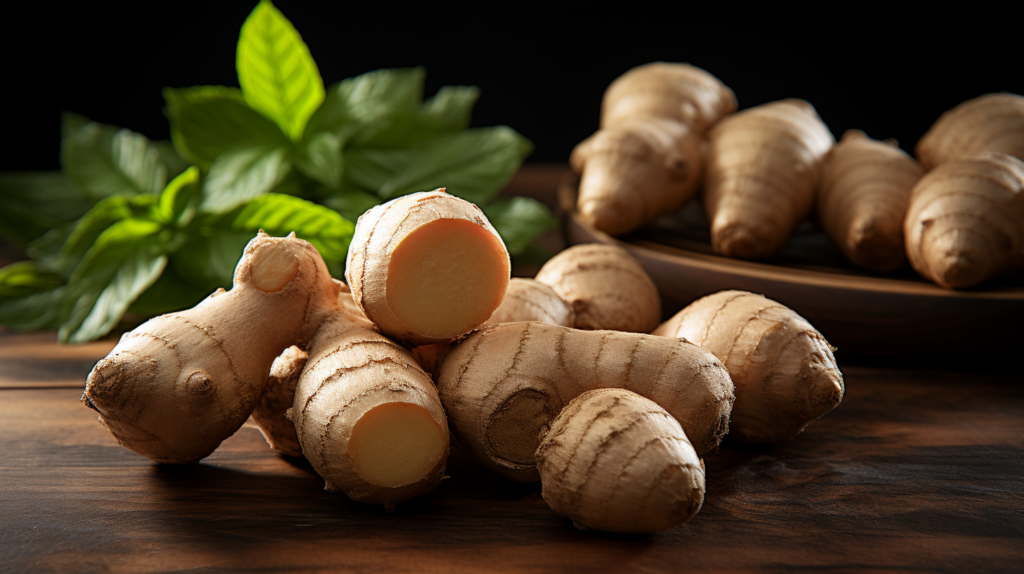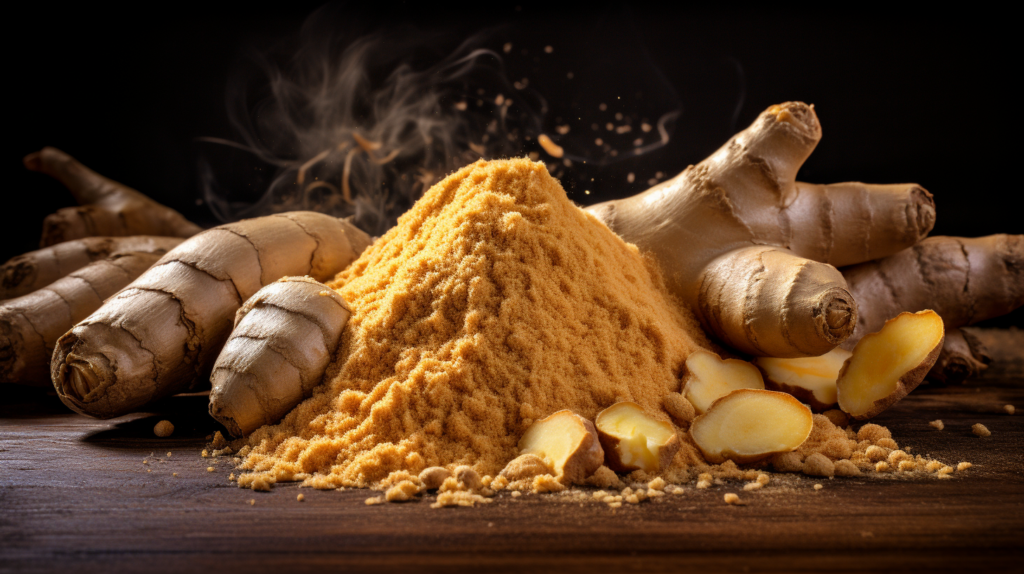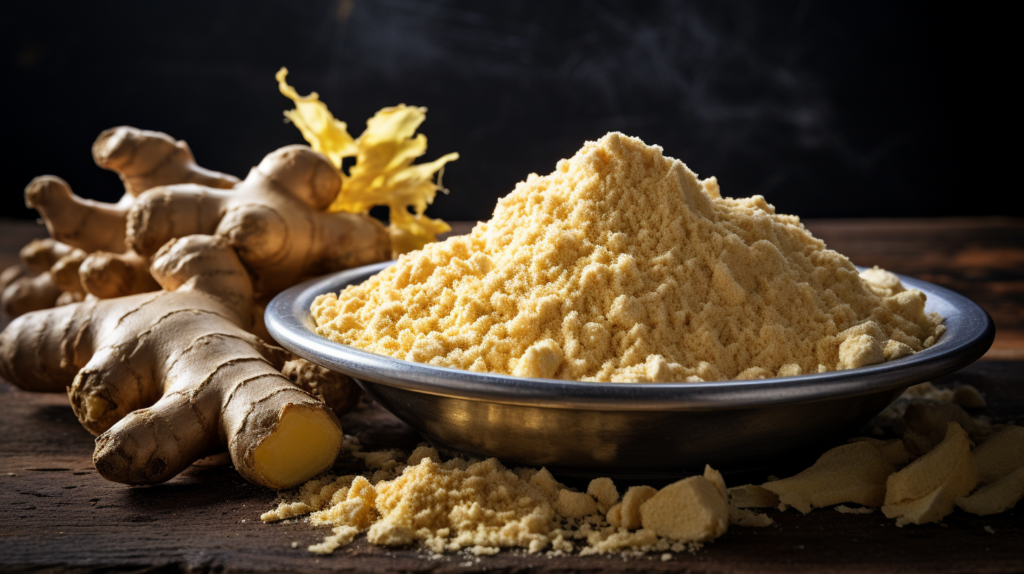If you’re seeking a natural remedy to ease digestion and reduce nausea, ginger might be the solution you’re looking for. Ginger has been revered for its medicinal properties for centuries and has been used to treat a myriad of ailments, including digestive issues.
Ginger contains gingerol, a compound with anti-inflammatory properties that can help relieve digestive discomfort, bloating, and indigestion. Additionally, ginger stimulates the production of digestive enzymes, which aids in the breakdown of food and leads to better digestive health.
Key Takeaways:
- Ginger naturally eases digestion and reduces nausea
- Ginger contains gingerol, a compound with anti-inflammatory properties
- Ginger stimulates the production of digestive enzymes
- Ginger can help relieve digestive discomfort, bloating, and indigestion

Ginger’s Digestive Properties
Ginger is a root that has been used for centuries to aid digestion and reduce gastrointestinal discomfort. This powerful root contains numerous compounds that make it effective in promoting healthy digestion, reducing inflammation, and improving overall gut health.
One of the key compounds in ginger is gingerol, which has potent anti-inflammatory properties. This helps to reduce inflammation in the gut, which can often lead to digestive discomfort such as bloating and cramping. Additionally, ginger stimulates the production of digestive enzymes, which can help to break down food more efficiently and improve nutrient absorption.
Ginger’s ability to calm an upset stomach is also well-known, making it an effective remedy for nausea and vomiting. This is particularly useful for those experiencing morning sickness or motion sickness. Ginger has also been found to be effective in reducing symptoms of indigestion, such as stomach pain and discomfort.
Ginger’s Digestive Properties:
| Property | Description |
|---|---|
| Anti-inflammatory | Gingerol reduces inflammation in the gut, reducing discomfort. |
| Stimulates Digestive Enzymes | Ginger helps to produce digestive enzymes, improving nutrient absorption. |
| Relieves Nausea | Ginger is a powerful natural remedy for nausea and vomiting. |
| Reduces Indigestion | Ginger has been found to be effective in reducing symptoms of indigestion, such as stomach pain and discomfort. |
Incorporating ginger into your diet is a simple and effective way to improve digestion and overall gut health. Whether you prefer to drink ginger tea, add fresh ginger to your meals, or take ginger supplements, this powerful root can provide numerous benefits for your digestive system. Stay tuned to learn more about how to use ginger for better digestion and overall gut health.

Relieving Nausea with Ginger
Ginger has long been known for its ability to effectively ease nausea, making it a popular natural remedy for digestive discomforts. Its anti-inflammatory properties and role in promoting the production of digestive enzymes can help alleviate symptoms such as indigestion, bloating, and gas.
Research has shown that ginger can be particularly effective in reducing nausea caused by motion sickness, morning sickness during pregnancy, and chemotherapy. It works by blocking specific signals in the brain that trigger nausea and vomiting, providing relief without any of the side effects often associated with prescription anti-nausea medications.
Ginger can be consumed in various forms to relieve nausea. Ginger tea, for instance, can be brewed by boiling fresh ginger slices in water for 10-15 minutes. Ginger supplements are also available in capsule form, providing a convenient and easy way to consume ginger on-the-go.
However, it is important to note that ginger may not be effective for everyone and may cause side effects such as heartburn, diarrhea, and upset stomach in some individuals. If you experience any adverse reactions, discontinue use and consult with your doctor.
Ginger and Digestive Health
In addition to its anti-nausea properties, ginger can also support overall digestive health. Its anti-inflammatory properties and ability to promote digestive enzyme production can help reduce gut inflammation and promote healthy digestion.
Ginger has also been shown to have a positive impact on gut microbiome, which is the community of microorganisms that reside in the digestive tract. A healthy gut microbiome is essential for overall digestive health and general well-being.
If you suffer from digestive disorders such as IBS or IBD, or experience frequent digestive discomforts, incorporating ginger into your daily routine may provide relief and promote overall gut health.
Next, we will discuss practical tips and advice on how to use ginger to improve digestion and overall gut health.

Using Ginger for Better Digestion
If you’re looking to incorporate ginger into your daily routine to improve digestion, there are a few different ways to do so.
Ginger Tea
Ginger tea is a popular and easy way to consume ginger for digestive benefits. Simply steep fresh ginger in hot water for 5-10 minutes and enjoy. You can also add other herbs such as mint or lemon for added flavor.
Ginger Capsules
Ginger supplements in capsule form are also available and can be a convenient way to incorporate ginger into your routine. However, it’s important to follow the recommended dosage instructions on the label and consult with a healthcare provider before use.
Fresh Ginger
Adding fresh ginger to your meals is another great way to reap its digestive benefits. Grate or finely chop fresh ginger and add it to stir-fries, soups, or marinades for a flavorful and healthy addition to your meal.
Whichever method you choose, start with small amounts of ginger and gradually increase to find what works best for you and your digestive system.

Natural Ways to Improve Digestion: Other Remedies Besides Ginger
While ginger is a potent natural remedy for improving digestion, there are other natural remedies and lifestyle changes you can incorporate into your daily routine to enhance your digestive health.
Eat a Balanced Diet
One of the most important factors in maintaining good digestion is to eat a balanced diet that is rich in nutrient-dense foods. This includes a variety of fruits, vegetables, whole grains, and lean proteins. Additionally, it’s important to avoid processed foods, sugary drinks, and excessive alcohol consumption, all of which can contribute to digestive discomfort and inflammation.
Stay Hydrated
Drinking plenty of water is crucial for maintaining optimal digestive health. Adequate hydration helps to flush out toxins, prevent constipation, and support the production of digestive enzymes. Aim to drink at least 8-10 cups of water per day, and consider adding hydrating foods such as watermelon, cucumbers, and celery to your meals.
Incorporate Probiotics and Fiber-rich Foods
Probiotics and fiber-rich foods can help to promote healthy gut bacteria and improve digestion. Probiotics can be found in fermented foods such as yogurt, kefir, and kimchi, while fiber-rich foods include fruits, vegetables, and whole grains. Consider adding these foods to your diet to support your digestive health.
Practice Mindful Eating
Mindful eating refers to the practice of paying attention to your food and eating slowly and intentionally. This can help to reduce overeating, prevent digestive discomfort, and improve overall digestive function. Take the time to enjoy your meals and savor each bite.
Get Regular Exercise
Regular exercise can also help to improve digestion by stimulating the movement of food through the digestive tract and reducing stress. Aim for at least 30 minutes of moderate exercise, such as brisk walking or cycling, on most days of the week.

Ginger and Gut Health
Ginger has been found to have numerous benefits for gut health. One of its key properties is its ability to reduce inflammation in the gut, which can lead to a healthier gut microbiome. In addition to this, research suggests that ginger may also be helpful in treating digestive disorders such as irritable bowel syndrome (IBS) and inflammatory bowel disease (IBD).
| Ginger and Inflammation | Ginger and IBS/IBD |
|---|---|
| Ginger has anti-inflammatory properties that can help reduce inflammation in the gut. | Ginger may be helpful in treating digestive disorders such as IBS and IBD. |
| Reducing gut inflammation can lead to a healthier gut microbiome and improved overall gut health. | Research suggests that ginger may help reduce symptoms of IBS, such as abdominal pain and bloating. |
| Ginger may also be effective in reducing inflammation associated with conditions such as ulcerative colitis and Crohn’s disease. | Additionally, ginger may help reduce inflammation in the colon, which can be beneficial for those with IBD. |
Ginger’s positive effects on gut health can be attributed in part to its anti-inflammatory properties, which help reduce inflammation and promote the growth of beneficial gut bacteria. Incorporating ginger into your diet can be a simple and effective way to support gut health and alleviate digestive discomforts.

Ginger as a Digestive Aid during Pregnancy
If you’re pregnant, you may have experienced nausea or indigestion at some point during your pregnancy. Ginger could potentially help alleviate these symptoms, making it a safe and natural option for expectant mothers.
Studies have shown that ginger can be effective in reducing nausea and vomiting during pregnancy. In fact, it may be as effective as some prescription medications that are commonly used for this purpose.
Additionally, ginger has anti-inflammatory properties that can help reduce inflammation in the gut, making it an effective option for relieving pregnancy-related indigestion and bloating. However, it’s important to note that while ginger is generally considered safe for most pregnant women, it’s important to consult with your healthcare provider before using it as a digestive aid during pregnancy.
They can advise you on the appropriate dosage and potential risks or considerations based on your individual health needs and pregnancy status. As with any natural remedy, it’s essential to use ginger safely and in moderation during pregnancy.

Incorporating Ginger into Your Diet
If you’re looking to incorporate ginger into your daily diet to improve digestion, there are many delicious and easy ways to do so. Here are some tips and recipe ideas to get you started:
Ginger Tea
One of the simplest ways to consume ginger is by making a cup of ginger tea. Simply steep a few slices of fresh ginger in hot water for 5-10 minutes, and enjoy. You can also add honey or lemon for extra flavor.
Ginger Smoothies
Add a kick of ginger to your morning smoothie for a delicious and nutritious breakfast. Blend together fresh ginger, banana, spinach, and almond milk for a tasty and digestion-friendly smoothie.
Ginger Stir-Fry
If you’re a fan of savory dishes, try incorporating ginger into your stir-fry. Simply sauté fresh ginger, garlic, and your favorite vegetables with a protein of your choice for a flavorful and healthy meal.
Ginger Dressing
Add some zing to your salads with a ginger dressing. Mix together fresh ginger, soy sauce, rice vinegar, honey, and olive oil for a delicious and digestion-friendly dressing.
Remember, when using fresh ginger in your cooking, be sure to peel and finely chop it before adding it to your dishes. This will make it easier to digest and enhance its flavor.

Ginger Supplements for Digestion
If you’re looking for an alternative to using fresh ginger for digestion, supplements may be an option worth considering. Ginger supplements are available in various forms, including capsules, tablets, and extracts. They offer a convenient and concentrated way to access ginger’s digestive benefits.
It’s important to choose a reputable brand and consult with a healthcare professional before taking any supplements, especially if you have any underlying medical conditions or are taking prescription medications. Generally, the recommended dosage for ginger supplements is 1 gram per day, but this can vary depending on the specific product and your individual needs.
Some potential advantages of using ginger supplements for digestion include:
- Convenience: Ginger supplements are easy to take and can be consumed anywhere, without the need for preparation or cooking.
- Concentration: Supplements typically contain higher concentrations of ginger’s active ingredients, making them more potent than fresh ginger.
- Longer shelf life: Ginger supplements have a longer shelf life than fresh ginger, allowing them to be stored for longer periods without losing effectiveness.
However, it’s important to note that ginger supplements may not be suitable for everyone, and there are some potential drawbacks to consider:
- Side effects: Like any supplement, ginger supplements may cause side effects such as stomach upset, diarrhea, and heartburn. It’s important to start with a low dosage and monitor any adverse effects.
- Interactions with medications: Ginger supplements may interact with certain medications, such as blood thinners or diabetes medication. Consult with your healthcare provider if you are taking any medications.
- Less fiber: Fresh ginger contains fiber, which is beneficial for digestion and gut health, but ginger supplements typically do not contain fiber.
Overall, ginger supplements can be an effective way to access ginger’s digestive benefits, but it’s important to use them responsibly and under the guidance of a healthcare professional.

Ginger and the Mind-Gut Connection
The mind-gut connection refers to the link between the central nervous system and the digestive system. Research shows that our emotions can directly impact our digestive health. When we experience stress or negative emotions, our digestive system can become disrupted, leading to symptoms such as bloating, constipation, and diarrhea.
Ginger, with its calming and anti-inflammatory properties, may positively impact the mind-gut connection by reducing stress and promoting a healthy gut microbiome. A 2018 review of studies found that ginger supplements may improve anxiety and depression symptoms in people with various health conditions, including those with irritable bowel syndrome (IBS).
Ginger’s ability to reduce gut inflammation may also play a role in supporting the mind-gut connection. A study published in the journal Molecular Nutrition & Food Research found that ginger extract reduced inflammation in the gut of mice with colitis, a type of inflammatory bowel disease (IBD).
Overall, while more research is needed to fully understand the link between ginger and the mind-gut connection, incorporating ginger into your diet may offer potential benefits for improving both your emotional and digestive well-being.
Ginger’s Digestive Benefits: Fact or Fiction?
There are numerous claims about the digestive benefits of ginger, and it can be challenging to distinguish fact from fiction. However, research has consistently shown that ginger can be an effective natural remedy for various digestive troubles.
One common myth is that ginger only provides a placebo effect. However, numerous studies have demonstrated its effectiveness in reducing nausea and vomiting, particularly in individuals undergoing chemotherapy or surgery. Ginger has also been shown to improve symptoms of indigestion, bloating, and constipation.
Another common misconception is that ginger is only effective in its raw form. While fresh ginger contains a higher concentration of gingerol, the compound responsible for ginger’s digestive benefits, studies have shown that cooked ginger or ginger supplements can also be effective.
Ginger is also often associated with stomach ulcers, with some believing it can cause irritation. However, research indicates the opposite may be true. Ginger has been shown to have anti-inflammatory and antioxidant properties, which can help protect and heal stomach ulcers.
In conclusion, the claims about the digestive benefits of ginger are not just fiction, but supported by scientific evidence. Whether consumed fresh, cooked, or as a supplement, ginger offers a safe and effective natural way to ease digestive troubles and promote overall gut health.

Conclusion
Congratulations, you have completed your journey into the world of ginger and digestive health! With its natural ability to ease digestion and relieve nausea, ginger has proven to be a valuable and effective addition to anyone’s daily routine.
By incorporating ginger into your diet, whether through tea, cooking, or supplements, you can help support optimal digestion and promote overall gut health. Remember to start small with ginger consumption and gradually increase your intake as needed. It is also important to consult with your healthcare provider before using ginger, especially if you have any pre-existing medical conditions or are pregnant.
Along with ginger, there are other natural remedies and lifestyle changes you can make to improve your digestive health, such as maintaining a balanced diet, staying hydrated, and incorporating probiotics and fiber-rich foods into your meals. Additionally, practicing mindful eating and regular exercise can also have a positive impact on digestion.
As you continue to explore the potential benefits of ginger and other natural remedies for digestive health, always stay informed and make well-informed decisions that work best for you and your unique needs. With the power of knowledge and a commitment to your well-being, you can experience the benefits of optimal digestive health and overall wellness.
FAQ
Q: How does ginger naturally ease digestion and reduce nausea?
A: Ginger has natural properties that can help improve digestion and reduce nausea. It can aid in digestion by reducing inflammation, promoting the production of digestive enzymes, and calming an upset stomach. Furthermore, ginger can alleviate common digestive discomforts such as indigestion and bloating.
Q: What are ginger’s digestive properties?
A: Ginger has several properties that make it effective in aiding digestion. It can improve digestion, reduce inflammation, and promote the production of digestive enzymes. Consuming ginger can also help alleviate indigestion, bloating, and other common digestive discomforts.
Q: How can ginger relieve nausea?
A: Ginger has been shown to be effective in relieving nausea. It can help calm an upset stomach and alleviate pregnancy-related nausea and indigestion. Furthermore, ginger can be used as a natural remedy for indigestion and bloating.
Q: How can I use ginger for better digestion?
A: There are several ways to incorporate ginger into your daily routine for better digestion. You can consume ginger tea, take ginger capsules, or add fresh ginger to your meals. It is important to follow appropriate dosage guidelines and be aware of potential side effects.
Q: Are there other natural digestion remedies?
A: Yes, there are other natural remedies and lifestyle changes that can complement the use of ginger for digestion. Maintaining a balanced diet, staying hydrated, incorporating probiotics and fiber-rich foods, practicing mindful eating, and regular exercise can all contribute to improved digestion.
Q: How does ginger impact gut health?
A: Ginger can have a positive impact on gut health. Its anti-inflammatory properties can help reduce gut inflammation and support a healthy gut microbiome. Studies have also shown potential benefits of ginger in treating digestive disorders such as irritable bowel syndrome (IBS) and inflammatory bowel disease (IBD).
Q: Can ginger be used as a digestive aid during pregnancy?
A: Yes, ginger can be used as a digestive aid during pregnancy. It can help alleviate pregnancy-related nausea and indigestion. However, it is important to follow guidelines for safe use and be aware of any potential risks or considerations for expectant mothers.
Q: How can I incorporate ginger into my diet?
A: There are many ways to incorporate ginger into your daily diet. You can use it in various culinary preparations, such as adding it to stir-fries, soups, or smoothies. There are also simple ginger-infused recipes available that can enhance digestion and overall gut health.
Q: Are there ginger supplements for digestion?
A: Yes, there are ginger supplements available for improving digestion. However, it is important to consider the advantages and potential drawbacks of using ginger in supplement form. It is recommended to choose reputable brands and follow appropriate dosages.
Q: What is the connection between ginger and the mind-gut connection?
A: Ginger may influence the mind-gut connection through its calming properties. The mind-gut axis is a fascinating link between the brain and the gut, and ginger’s ability to calm the digestive system may positively impact gut health and digestion.
Q: Are ginger’s digestive benefits fact or fiction?
A: Ginger’s digestive benefits are supported by scientific evidence. It has been shown to effectively ease digestion, reduce nausea, and promote overall gut health. Ginger is a natural remedy with numerous benefits for digestion.














